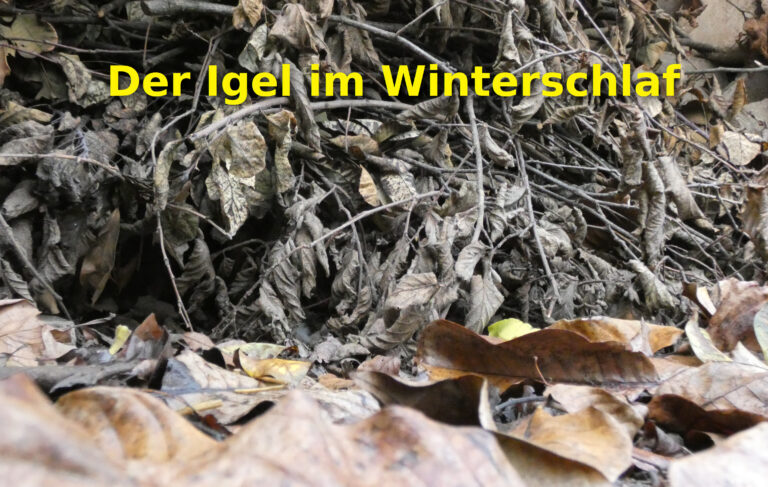Slowly it is getting closer to winter and the attentive observer of the hedgehog camera on my website will surely have noticed. The visits of the hedgehogs at the feeding place are getting rarer and rarer. The reason for this is that the hedgehogs are going into hibernation, or some of them are even already there. I have summarized some information about the hibernation of hedgehogs:
Difference between Winter rest and Winter Hibernation
During Winter rest the animals maintain a longer lasting sleep, while the body temperature and metabolism changes only little. The animals can react to external stimuli and can wake up quickly.
When hedgehogs hibernate, body temperature and metabolism are reduced to a minimum. The body temperature approaches the ambient temperature. Only when the temperature approaches 0°C does the animal produce heat again to maintain a minimum temperature. Hedgehogs hardly react to external stimuli anymore.
Why does the hedgehog hibernate at all?
The main reason is the food shortage in winter. The hedgehog is an insectivore. From autumn on, the offer decreases more and more. Therefore, the hedgehog lacks the energy-supplier. The hedgehog has only a spiny coat, which is not very suitable for warming the body. Therefore the hedgehog must expend a lot of energy to maintain his body temperature. This is hardly possible in winter due to lack of food, so the hedgehog goes into hibernation. Other influences are the decreasing length of daylight, falling outside temperatures and hormonal changes.
When does the hedgehog go into hibernation?
When the hedgehog has eaten a sufficient amount of fat for the winter, the hedgehog goes into hibernation. First the male hedgehog goes into hibernation. Depending on the weather, this can happen as early as the beginning of October.
Next the female hedgehog goes into hibernation. They still recover from rearing their young and therefore usually need a little longer until they have eaten the necessary fat reserves.
Finally, the young hedgehogs go to sleep. They need the longest time to eat their hibernation weight. A young hedgehog should weigh about 500g to 600g so that he can survive hibernation under his own power.
Metabolic changes during hibernation
The hedgehog hibernates on low flame. The metabolism is reduced to an average of only 1-5% of its active phase. The body temperature drops to almost ambient temperature. The heart then beats only 2-12 times per minute instead of 200 times, and the breathing rate drops from 50 times to only about 13 times per minute.
The values of the other organs also change, e.g. the blood sugar level drops.
As soon as the outside temperature falls below 5°C, the hedgehog produces a little more heat again to maintain the minimum temperature and not to freeze to death.
The duration of hibernation
The average hibernation lasts 5-6 months. During this time, however, the hedgehogs can awaken quite briefly, but usually remain in the nest and sleep again soon. It can also happen that the hedgehog wakes up for a few days, even becomes active and leaves its nest. The reason we suspect is that it is a kind of “reset” of the metabolism to normal values.
Falling asleep and waking up
It takes about 5-6 hours until the hedgehog falls asleep. During hibernation, the hedgehogs then use up the fat reserves from the so-called white depot fat, which they have stored under the spiny bellows.
The hedgehogs wake up when the outside temperature is about 10°C. Waking up takes several hours and consumes large amounts of energy. For this the hedgehog has the so-called “brown fat”, which is stored in the shoulder area. When waking up, the blood circulation increases up to five times and the heart and respiratory rate rises sharply. During awakening the body and legs shake.
During hibernation the hedgehog loses about 30% of its body weight. Therefore, the most important thing for the hedgehog after waking up is first to find food. Only then does the time to mate and reproduce begin again.
Translated with www.DeepL.com/Translator (free version)




